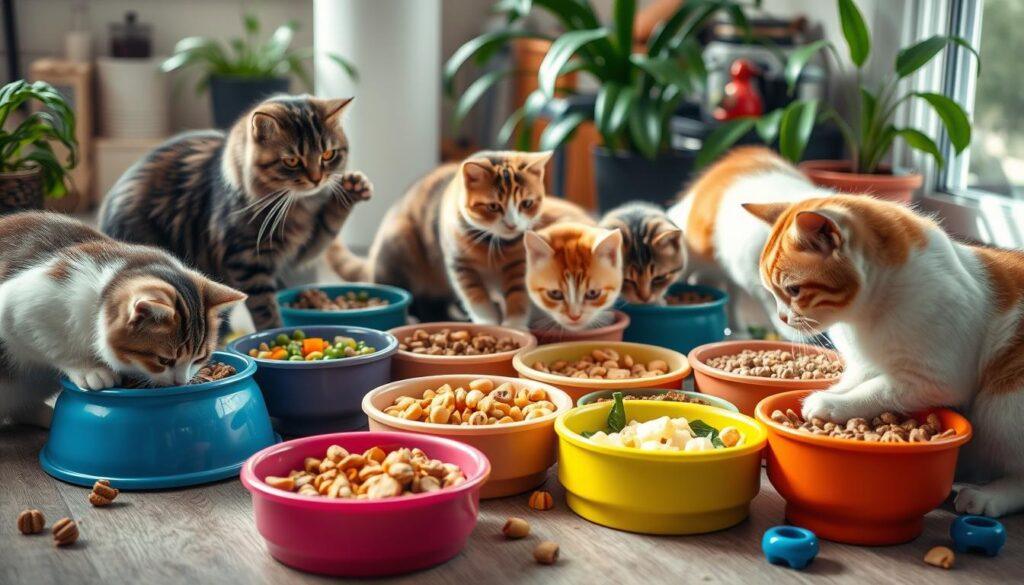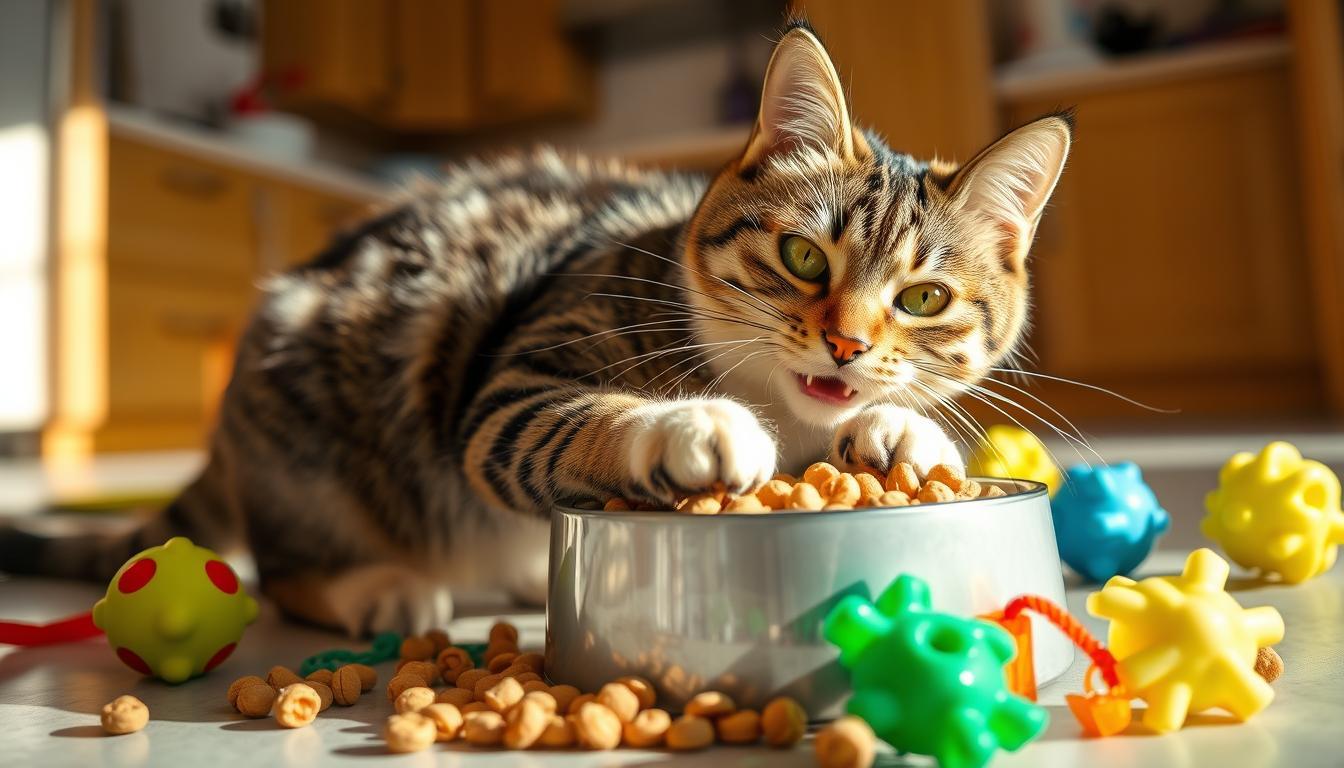Did you know that 59% of cats in the U.S. are overweight or obese1? This is a big problem. It shows how important it is to know about your cat’s feeding habits. We need to stop food obsession before it hurts their health.
Cats who used to be stray or grew up on the streets often love food too much2. But even indoor cats can get too focused on food. They might keep begging, meowing, and acting aggressively when it’s time to eat.
Being too heavy can hurt a cat’s joints and organs1. It can also increase the risk of diabetes, arthritis, heart disease, and even cancer. As pet owners, we must watch for signs of food obsession. We need to make sure they stay healthy by giving them the right feline nutrition.
While cats don’t usually get aggressive about food like dogs do, eating too fast can still be a problem3. It can lead to obesity or upset their stomach if they throw up a lot. By understanding why cats get obsessed with food and teaching them to eat better, we can help them live longer and happier lives.
Key Takeaways
- Over 50% of cats in the U.S. are overweight or obese, leading to serious health risks1.
- Cats with a history of living as strays may be more prone to food obsession due to their past experiences2.
- Cheap commercial cat foods often lack proper nutrition, so consider feeding your cat a higher-quality diet2.
- Consult your vet if your cat’s hunger seems excessive or their behavior changes suddenly2.
- Encourage exercise and mental stimulation to distract food-obsessed cats and maintain a healthy weight2.
- Ensure your cat always has access to clean water to rule out thirst as a cause of excessive hunger2.
Signs Your Cat is Obsessed with Food
As a cat owner, it’s key to know when your cat might be too into food. Cats naturally love food and often want what you’re eating. But, some behaviors can mean they’re really obsessed. Studies show about 50% of cats act out because they’re too focused on food4.
Aggressiveness Around the Food Bowl
Aggression when you get near their food bowl is a big sign. If your cat gets angry or protective of their food, it’s a warning. Cats with food obsession can be very hungry, aggressive, and even eat things they shouldn’t4.
But, with the right help, like food desensitization, they can get better4.
Persistent Begging and Meowing for Food
Constantly asking for food, even after eating, is a red flag. Cats might be curious about automatic feeders at first5. But, if they keep meowing for food all day, it could mean their diet is off or they’re eating too much5.

Over-Excited Behavior at Mealtimes
Is your cat super excited or anxious when it’s time to eat? This could mean they’re obsessed with food. Many cats like to eat little bits all day5.
Using an automatic feeder can help them eat right and avoid getting too fat5. But, if they’re too excited, it’s time to talk to the vet to check for health problems.
| Sign of Food Obsession | Potential Causes | Solutions |
|---|---|---|
| Aggressiveness around food bowl | Psychogenic abnormal feeding behavior | Behavioral modification programs |
| Persistent begging and meowing | Incorrect diet, low-quality food, incorrect feeding amounts | Consult with veterinarian, adjust diet |
| Over-excited behavior at mealtimes | Preference for grazing or multiple small meals | Implement automatic feeder, consult with veterinarian |
Remember, food obsession in cats is a real issue that needs vet help5. Diseases like hyperthyroidism and diabetes can make cats act strangely, showing why vet checks are key4. By watching for these signs and working with your vet, you can keep your cat healthy and avoid obesity problems.
Medical Reasons for Increased Appetite in Cats
If your cat is always hungry, it might be a sign of a health problem. Cats can get hungrier due to many health issues, like parasites or metabolic problems. As a pet owner, knowing these causes is key. If your cat’s eating habits change, get veterinary advice for cats right away.
Parasite Infestations
Intestinal parasites like roundworms and tapeworms can make cats hungry all the time. They take calories from your cat’s food, making them hungry for more6. These parasites also stop your cat from absorbing nutrients well, making them always hungry7.
Diabetes and Thyroid Conditions
Diabetes and thyroid issues can also make cats hungry. Cats with diabetes might not make enough insulin or use it well, making them always hungry6. They can’t use glucose well, so they always feel hungry7.
Cats with too much thyroid hormone are hungry all the time too67. This is more common in older cats. They might also lose weight, drink a lot, and be restless.
| Condition | Cause | Effect on Appetite |
|---|---|---|
| Intestinal Parasites | Roundworms, tapeworms | Increased hunger due to nutrient theft |
| Diabetes Mellitus | Insufficient insulin or insulin resistance | Constant hunger due to inability to utilize glucose |
| Hyperthyroidism | Overproduction of thyroid hormone | Significantly increased appetite and boosted metabolism |
Other health issues like IBD, intestinal cancer, and EPI can also make cats hungry6. These problems stop your cat from absorbing nutrients well. This can lead to weight loss even if they eat more.

If your cat eats too much and it worries you, see a vet. They can check your cat, do tests, and find the right treatment. By taking care of your cat’s health, you ensure they get the nutrition they need to be happy and healthy.
Nutritional Deficiencies and Food Obsession
Cats need different amounts of food at different life stages. Pregnant and nursing cats need more than older cats8. It’s important to give the right amount of food for your cat’s needs. Nutritional deficiencies can cause odd eating habits like pica. This is when cats eat things they shouldn’t, like shoelaces or plastic9.
Medical issues like parasites, diabetes, or thyroid problems can make cats very hungry8. If your cat is eating too much or too little, see a vet. They can check for health problems and help manage your cat’s diet9.
Choosing the right cat food is key to keeping your cat healthy. Look for these things in a cat food brand:
- High-quality protein sources
- Balanced nutrient profile
- Age-appropriate formulation
- Wet and dry food mix (80% dry, 20% wet) to keep them hydrated and full8
Check the nutrients in different cat food brands. This ensures your cat gets the best nutrition:
| Brand | Protein % | Fat % | Fiber % |
|---|---|---|---|
| Brand A | 35 | 15 | 4 |
| Brand B | 32 | 12 | 6 |
| Brand C | 30 | 18 | 3 |
Always talk to your vet or a pet nutritionist if you’re not sure about your cat’s diet. They can help pick the best food for your cat based on their age, health, and needs.
“Proper feline nutrition is essential for maintaining a healthy and happy cat. By providing a balanced diet and addressing any underlying medical issues, you can help prevent food obsession and ensure your cat’s well-being.”
About 50% of cats in the U.S. are overweight or obese8. This can lead to serious health problems. It’s important to watch your cat’s weight and adjust their diet to keep them healthy.
Breaking Your Cat’s Food Obsession
If your cat is always focused on food, it’s time to make a change. Cats obsessed with food may act aggressively at their bowls, beg constantly, and get too excited at mealtime. By changing their feeding habits, you can help them stay healthy and stop their food obsession.
Feed High-Protein, Balanced Meals
Feeding your cat high-protein food can help them feel full longer8. Try mixing 80% dry food with 20% wet food. This can make them drink more water and feel more satisfied8. It’s important to make sure their diet is balanced and meets their nutritional needs. This can help reduce their appetite and food-seeking behavior.
Establish a Consistent Feeding Schedule
Feeding your cat at set times can stop overeating and begging10. Instead of leaving food out, feed them small amounts throughout the day8. This can help control their eating and prevent too much hunger between meals. Don’t refill their bowl every time they cry out, as this can make them always hungry10.
| Feeding Schedule | Benefits |
|---|---|
| 2-3 small meals per day | Prevents overeating and regulates hunger |
| Combination of wet and dry food | Encourages water intake and promotes satiety |
| Remove uneaten food after 15-20 minutes | Discourages grazing and reinforces scheduled mealtimes |
Discourage Begging and Reward Good Behavior
To stop your cat’s food obsession, you must discourage begging. Place them in a separate room or ignore their begging. This can help break the habit over time10. Also, negative reactions to begging can discourage cats from seeking food8.
Positive reinforcement with love, attention, and praise can improve their feeding habits8. Spend 15 to 20 minutes playing with your cat each day. This can help fight food obsession10.
Remember, breaking your cat’s food obsession requires patience, consistency, and a commitment to providing a balanced diet and structured feeding schedule.
Feline Obesity and Food Obsession
Feline obesity is a big worry for many pet owners and vets. Studies show that up to 50% of cats in the U.S. are overweight or obese8. This problem is linked to tasty cat food that makes cats eat too much, leading to obesity11. Also, cats that eat all day tend to gain too much weight11.
Cats might overeat for many reasons, like being too hungry or having health issues like parasites, diabetes, or thyroid problems8. They usually know how much to eat, but they can overdo it if they get the chance12. Overweight cats often get into the habit of eating too much11.
Health Risks Associated with Overweight Cats
Overweight cats face serious health problems. These can include arthritis, diabetes, and diseases affecting their organs8. These issues can make their life and lifespan much harder.
- Arthritis
- Diabetes
- Organ-related diseases
It’s important for owners to know these risks and help their cats stay at a healthy weight.
Importance of Weight Management for Cats
Managing a cat’s weight means controlling portions, feeding meals, and giving the right food for their age and health118. Kittens need different food than adult cats to grow right8.
Some ways to fight feline food obsession and keep them healthy include:
| Strategy | Benefit |
|---|---|
| Feeding high-protein pet food | Helps cats feel fuller for longer8 |
| Combining 80% dry and 20% wet food | Encourages proper hydration and a sense of fullness8 |
| Feeding little and often throughout the day | Helps manage food obsession8 |
| Using interactive food toys | Slows down food inhalers and changes eating habits11 |
| Offering snack vegetables like green beans, broccoli, and cauliflower | Provides low-calorie alternatives11 |
By using these methods and working with a vet, owners can keep their cat’s weight in check. Regular vet visits and weight checks are key to keeping your cat healthy.
When to Consult Your Veterinarian
If your cat’s appetite suddenly increases or they seem hungry after eating, it’s time to see the vet. Some cats might eat more due to learned behavior without a health issue7. But, many health problems can make cats hungrier, like pregnancy, hyperthyroidism, or diabetes76.
Issues like inflammatory bowel disease or parasites can stop cats from absorbing nutrients well76. This makes them always hungry. Parasites, especially roundworms and tapeworms, can also make cats hungrier6.
Other signs that need veterinary advice for cats include drinking and urinating too much, vomiting, diarrhea, and finding worms in feces7. Severe hunger might mean hyperthyroidism6. Diabetes can also cause cats to eat more, along with losing weight6.
Your vet will do tests like bloodwork and fecal testing to find health issues6. A medical check is key to managing cats obsessed with food4. Treatments might include diet changes, medication, or surgery, based on the diagnosis6. For diabetes, cats might need insulin and special feline nutrition plans6.
Changing management and behavior can help food-obsessed cats and their owners4.
| Condition | Symptoms | Diagnostic Tests | Treatment |
|---|---|---|---|
| Hyperthyroidism | Severe hunger, weight loss | Bloodwork | Medication, surgery |
| Diabetes Mellitus | Excessive hunger, weight loss | Bloodwork, urine testing | Insulin therapy, specific diet |
| Intestinal Parasites | Increased appetite, weight loss | Fecal testing | Deworming medication |
My Cat is Obsessed with Food: A Common Concern
Many cat owners worry about their pets’ endless hunger. Cats meowing for food and acting aggressively at mealtime is common. While cats love their food, an obsession can be a worry. Feline obesity is a big issue in the U.S., with up to 50% of cats being overweight or obese8.
Understanding your cat’s feeding habits is key. It’s important to address why they’re obsessed with food. This is crucial for their health and happiness.
Understanding Feline Feeding Behaviors
Cats are natural hunters and eat small meals all day. Kittens need more calories, while senior cats might eat more due to aging13. But, not all cats know when to stop eating. Some cats overeat because they enjoy it8.
Signs of a cat obsessed with food include:
- Aggressiveness around the food bowl
- Impatience at mealtimes
- Over-excitement at meals
- Pestering for food8
One cat showed extreme behavior around food, jumping on counters and being aggressive when offered food4. While no breed is hungrier than others, some cats may seek food aggressively13.
Addressing the Root Cause of Food Obsession
Food obsession isn’t always about gluttony. It can be due to health issues like parasites, diabetes, and thyroid problems8. Diseases like hyperthyroidism and diabetes can make cats hungrier and change their behavior4. A vet visit is needed for cats with increased hunger to find health issues13.
Poor diet can also make cats feel hungry all the time if it lacks nutrients or protein13. Giving the right feline nutrition is vital for a healthy diet8. High-protein food can keep cats full longer, and mixing 80% dry with 20% wet food helps with hydration and satisfaction8.
| Cause | Solution |
|---|---|
| Boredom | Provide mental stimulation and increased activity levels13 |
| Stress | Reduce stress levels and provide environmental enrichment4 |
| Learned behavior | Implement behavior modification techniques4 |
Getting veterinary advice for cats with food obsession is key. It helps rule out health issues and creates a plan to manage their obsession. By understanding your cat’s feeding habits and addressing their obsession, you can help them stay healthy and happy.
Conclusion
If your cat loves food too much, it’s key to find out why. Signs include being aggressive at the bowl, always asking for food, and getting too excited at mealtime7. Health issues like pregnancy or diabetes can make them hungry7. But boredom, stress, and habits can also play a part14.
Some cat breeds, like Chartreux and Persians, tend to eat more and get lazy, leading to weight gain14.
To tackle your cat’s food obsession, first check for health problems with your vet. If tests show nothing, it might be a learned behavior7. A regular feeding schedule and high-quality food can help. Slow feeders and playtime can also make a difference.
Adding toys, playing with your cat, and praising them can reduce stress and boredom147.
Remember, sudden changes in appetite mean a vet visit is needed7. Understanding your cat’s diet and managing their weight can keep them healthy and happy. With patience and the right steps, you can help your cat enjoy a better life.
FAQ
What are some signs that my cat is obsessed with food?
Can medical issues cause my cat to be obsessed with food?
How can I ensure my cat is getting the right nutrition?
What can I do to help break my cat’s food obsession?
Is feline obesity a common problem?
When should I consult my veterinarian about my cat’s food obsession?
Can a cat’s past experiences contribute to food obsession?
Source Links
- Why Is My Cat Obsessed With Human Food? – Berry Patch Farms – https://www.berrypatchfarms.net/cat-obsessed-with-human-food/
- What to Do if Your Cat is Obsessed With Food – Don’t Cramp My Style – https://www.dontcrampmystyle.co.uk/2020/07/what-to-do-if-your-cat-is-obsessed-with-food.html
- Food Obsessed Pets and Why Pets Gobble Food – https://amyshojai.com/food-obsessed-pets-and-why-pets-gobble-food/
- Is Your Cat Always Hungry, or Obsessed? – https://www.petmd.com/blogs/nutritionnuggets/cat/jcoates/march/2013/cats-obsessed-with-food-29894
- My Cat Is Obsessed With Their Automatic Feeder, Should I Worry? Vet-Reviewed Causes & Facts – Catster – https://www.catster.com/cat-behavior/cat-obsessed-with-automatic-feeder/
- Why Is My Cat Always Hungry? – https://www.petmd.com/cat/symptoms/why-my-cat-always-hungry
- My Cat Is Obsessed with Food, Is Something Wrong? Vet-Verified Facts – Catster – https://www.catster.com/cat-behavior/cat-obsessed-with-food/
- Is your cat obsessed with food – https://www.madisonanimalcare.com/cat-obsessed-with-food
- Unusual Cat Cravings: Why Is My Cat Eating That? – https://www.webmd.com/pets/cats/features/unusual-cat-cravings
- How To Deal With A Food-Obsessed Cat – CatTime – https://cattime.com/cat-facts/health/23313-how-to-deal-with-a-food-obsessed-cat
- Feeding a Cat Who is a Glutton | VCA Animal Hospitals – https://vcahospitals.com/know-your-pet/feline-gluttons
- 5 Strange Cat Eating Habits – https://www.petmd.com/cat/general-health/strange-cat-eating-habits
- 9 Reasons Your Cat Is Always Hungry | Great Pet Care – https://www.greatpetcare.com/cat-nutrition/reasons-your-cat-is-always-hungry/
- Food Obsession in Cats – https://catexplore.com/food-obsession-in-cats/


